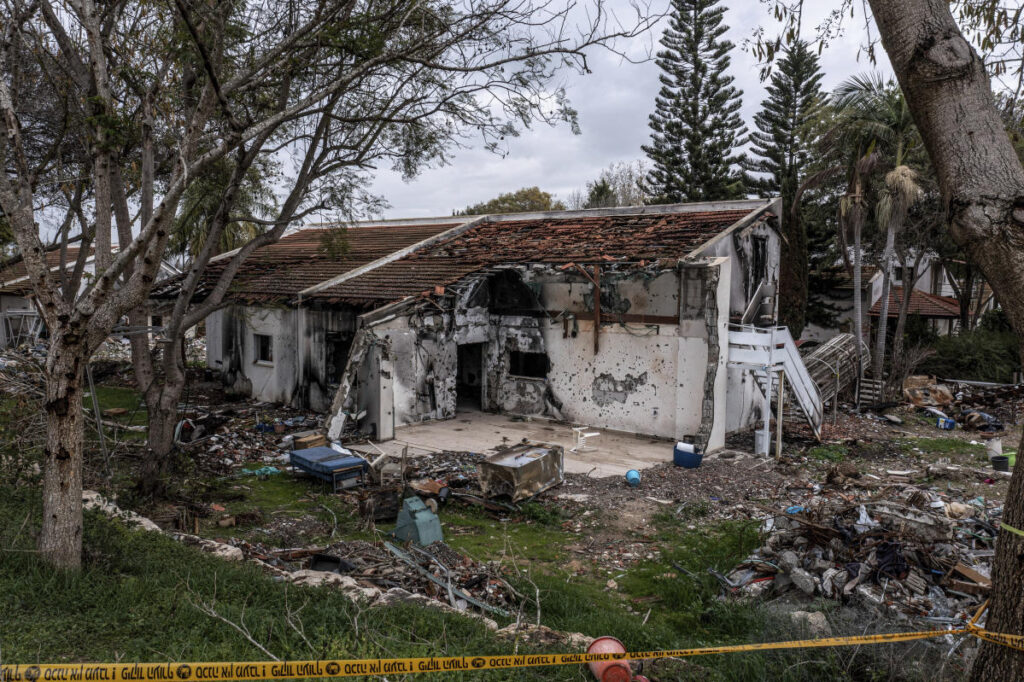JERUSALEM (AP) — The Israeli military said Thursday that Israeli hostages held in a house hit by tank fire on Oct. 7 last year were likely killed by Hamas militants, not by Israeli shelling. The military released the results of its initial investigation into mistakes in the deadly attack that sparked a nine-month war in Gaza.
Although the army appeared to absolve itself of the tank attack, it acknowledged that day that it had made a series of mistakes in its core mission of protecting the country’s citizens, including slow reaction times and disorganization during the confrontation at Kibbutz Be’eri.
“The fighting in the area in the first hours was characterized by a lack of command and control and a lack of coordination and order between different forces,” the report said. “This caused a number of incidents in which security forces gathered at the entrance to the kibbutz and did not engage in direct combat.”
Be’eri, located just a few kilometers (miles) from the Gaza border, was one of the communities hardest hit in the early morning Hamas attack that killed more than 100 people and took more than 30 hostage.
It was also the scene of one of the most high-profile incidents of October 7: a confrontation in which militants held a group of hostages in a house. Survivors said that during the confrontation, a tank fired into the house, raising concerns that the 13 hostages inside were killed by friendly fire.
The military said in its investigation that the kibbutz had been overrun by some 340 Hamas fighters and that militants had killed most of the hostages. How the military reached that conclusion, however, is unclear. The report called for additional testing.
Investigators “have determined that, based on the information reviewed and to the best of their knowledge, no civilians inside the building were injured by tank shell fire,” the report concluded, although it said two Israeli civilians outside the building were hit by shrapnel. One of those civilians died, the man’s wife said.
It also said commanders at the scene had made “professional and responsible decisions” in ordering the tank attack. It said a joint decision was made by several commanders after they heard gunfire around the house and militants said they planned to kill the hostages and commit suicide.
However, the report admits that mistakes were made on a large scale that day.
“The investigation team determined that the military failed in its mission to protect the residents of Kibbutz Be’eri,” the team said. “The courage of the residents of Be’eri and the members of the kibbutz’s civilian rapid response team is commendable and was critical in stabilizing the defense line during the first hours of the battle.”
The Israeli army has been heavily criticized by Palestinians and human rights groups, who say it to research rarely lead to punishment.
The residents of the kibbutz had mixed reactions to the report. They expressed anger at the failure of the army that day, but were also grateful that the army took responsibility.
Meir Zarbiv, a resident whose brother and sister were both killed on October 7, called the report a “deception” by the military. “I don’t believe the report and I don’t believe anything in it,” he said.
He said he still cannot understand why it took the army almost four hours to arrive at the kibbutz and then even longer at the main gate as soldiers waited for orders to enter.
“I just don’t believe what happened here. I have no explanation,” he said. “Where was the army?”
In a statement, the community called the investigation “thorough” and said it helped them understand the complexities of the fighting that day.
“We believe it is imperative that the military accepts blame and responsibility for its complete failure to protect us and asks for forgiveness for having abandoned us for hours during an attack of unparalleled evil,” the report said.
The kibbutz also called for an official state commission of inquiry into the broader failings of October 7, “so that the unimaginable loss we have experienced will never be experienced by another citizen again.”
The surprise cross-border attack killed some 1,200 people, most of them civilians, and took 250 hostage in the deadliest attack in Israel’s 76-year history. The assault, which saw several thousand militants storm across the border without resistance, exposed serious shortcomings in the military’s preparedness, intelligence assessments and the policies enacted by political leaders toward Gaza.
An Israeli offensive launched in response to the attack has killed more than 38,000 Palestinians, displaced more than 80 percent of the territory’s population and created a humanitarian disaster in Gaza, according to local health authorities. Israel now faces war crimes and genocide charges in international courts.
The military has launched multiple investigations into the October 7 failures, and the head of military intelligence has resigned. Several other commanders have apologized and taken responsibility for their failures.
However, Prime Minister Benjamin Netanyahu has rejected repeated calls for an official state investigation, even as the war enters its 10th month.
Netanyahu has said no investigation can be conducted while the country is focused on the war against Hamas, saying any questions will be answered at the appropriate time. But critics accuse the Israeli leader of dragging his feet to avoid what will almost certainly be harsh criticism of his policies and leadership.
Amid fierce international criticism, Netanyahu has vowed to continue the war until Hamas’ military and administrative capabilities are destroyed and the approximately 120 hostages still held in Gaza can return home.
International mediators have launched new efforts to broker a ceasefire between Israel and Hamas.
On Thursday, Netanyahu announced he would send a team of negotiators to Cairo to continue ceasefire talks, but reiterated that he will not stop the war until Israel achieves its war goals.
___
Associated Press journalists Tia Goldenberg and Isaac Scharf contributed to this report.

